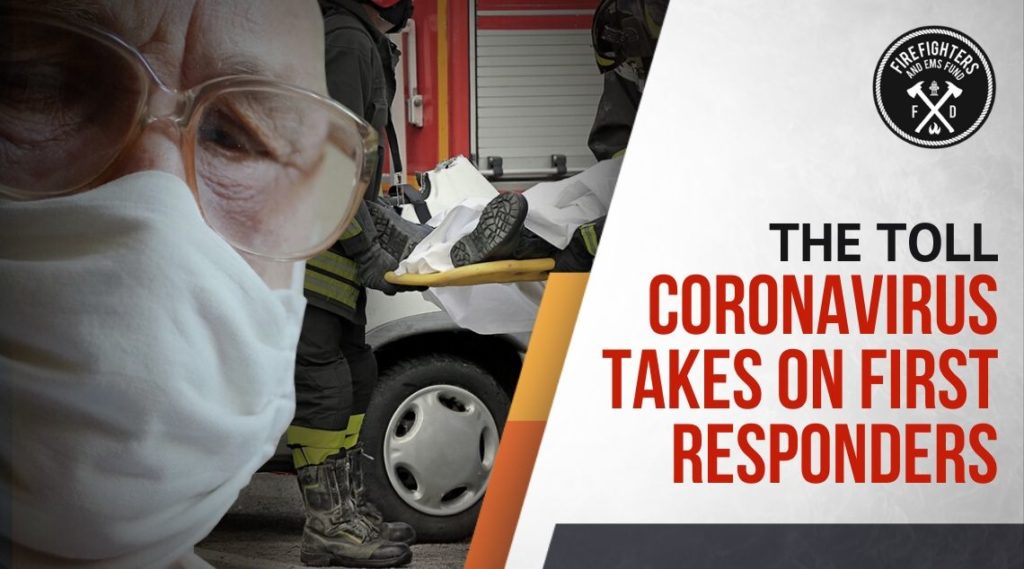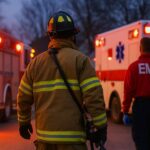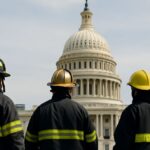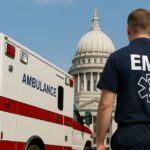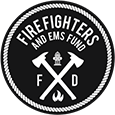The United States is well into its battle with COVID-19. At the time this article is being published, there over 1 million confirmed cases and 70,000 deaths due to the virus. As we watched our country scramble to respond to the mounting cases, federal and state funding has been passed to provide medical supplies to patients and health care providers, from basic personal protective equipment (PPE) to ventilators. But as hospitals, doctor offices, and other healthcare providers receive priority for billions of dollars in federal funding, EMS responders are being left behind.
A common theme across all healthcare facilities is the shortage of medical equipment to treat infected patients. Lack of masks, gloves, gowns, and other basic PPE leaves healthcare workers at risk of infection and spreading the virus to others. But the difference between an emergency room doctor and EMS worker is the level of attention they’re getting on both a federal and state level, even when EMS responders are often the first point of contact for an infected person. In an interview with U.S.News, Matt Zavadsky, president of the National Association of Emergency Medical Technicians, says “we are an extension of the health care system, but we are not being treated by our governmental leaders as essential partners in this war.”
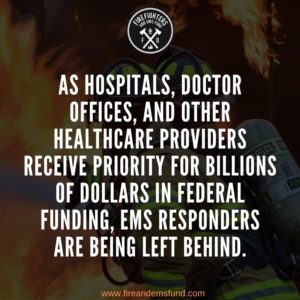
After coronavirus started sweeping the nation in March, Congress authorized $100 billion to pay for COVID-19-related health care expenses, $100 million of which was designated to buy PPE and related supplies for firefighters and emergency medical services. But even with this assistance, many EMS organizations are still left coming up short in the battle, and many advocates claim it isn’t enough to ensure they can effectively respond to the virus. And this couldn’t have happened at a worse time; many EMS agencies were at risk of closing due to lack of funding even before the outbreak. And with many sick individuals waiting to seek medical attention until symptoms require emergency care, 911 calls are at an all-time high (New York City reported their calls were up 50% in March). On top of this, many EMS agencies are identifying patients that can be treated on-scene rather than having to be transported, a move to prevent overwhelming hospitals. But the Federal Centers for Medicare and Medicaid Services only reimburse ambulance trips if a patient is actually transported – leaving many agencies without payment for their services, payment that provides them with equipment and tools that prevent infectious illnesses, like coronavirus, from spreading. All of this mounts to an overwhelming inability for EMS responders to do their jobs safely and effectively.
And these are just the physical tolls of the job during a pandemic. Firefighters and EMS workers already face a heightened risk for occupational mental health distress. But Vincent Variale, president of the Uniformed EMS Officers Union in New York City, Local 3621, compares the worst days of the pandemic to some of the nation’s darkest moments. “This is like 9/11 happening every day,” Variale said. “We were already understaffed to begin with, but now we have more people out sick and we have an increase in the call volume,” Variale said. “This is a recipe for disaster.”
NPR spoke with Don Goepfert, an EMT in New York. “Some people are sleeping in their cars and not even going home or sleeping in the basement where they live,” Goepfert said of his EMS colleagues who are trying to prevent spreading the virus to their friends and families. For New York City Fire Department paramedic Elizabeth Bonilla, anxiety and stress of seeing countless lives lost every day to the virus has left her leaving the lights on at night. “It’s hard for me to fall asleep in the dark because I get the image of that lady or that man who either passed away or who’s suffering,” Bonilla said. “I hear the cries. I hear the agony of people suffocating, trying to breathe.”
Just like the emergency room doctors, nurses, and infectious disease specialists who are risking their lives to fight this deadly virus, EMS responders, firefighters, and policemen are on the frontlines. Now more than ever they need our support, so they can get the attention, supplies, and funding they need to keep the public safe. We cannot forget the heroes who are often the first step in life-saving action, even if it means doing it without a mask. Last week, Don Goepfert was diagnosed with COVID-19. “I’m kind of upset that I’m sick because I want to be out there,” he said. “It’s our time to shine and prove to the city that our services are much needed.”
Staying informed on the issues firefighters and EMS workers are facing, ballots measures designed to protect them, and advocating for political reform are all ways you can help solve these issues.

